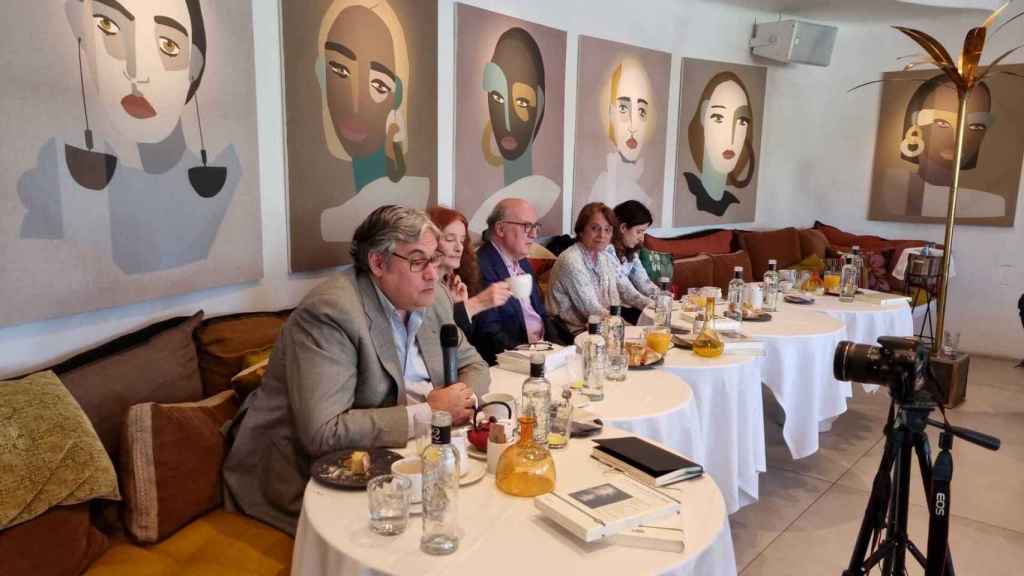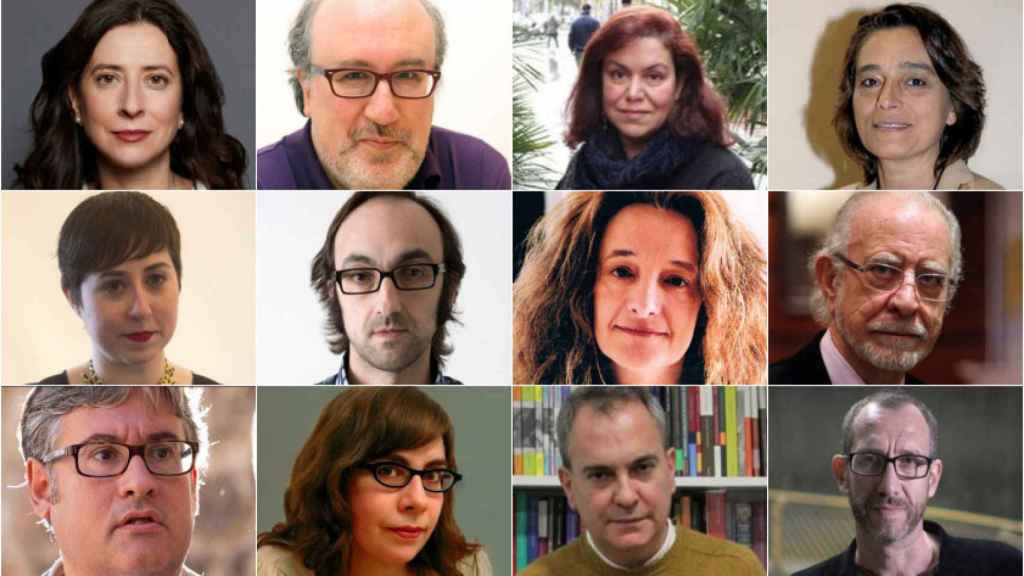Related news
The coming-out of Twelve visions for a new world, where is the human being headed?the last volume of Fundación Banco Santander’s Obra Fundamental Collection, brought together eight of its twelve authors this morning at Cultura Commodore –Ana Merino, Andres Ibanez, Cristina Cerezales Laforet, Irene Grace, Jose Maria Merino, Juan Manuel de Prada, Mercedes Cebrian Y Paul d’Ors– who have agreed that the future of the human species will depend on the search for the spiritual.
An idea that emerged in the pandemic with the intention of creating a hotbed of reflection and imagination through the story, because from Banco Santander Foundation “we could not remain oblivious to this time of uncertaintytransformations and paradigm shift without encouraging, from our commitment to promote culture and thought, a literary reflection around a fundamental question: where are we headed? Francisco Javier Expositoresponsible for the project.
Hence the need for this book of stories, which has fabulous unpublished material in podcast, both in-depth interviews with each of the authors and twelve stories dramatized by professionals who give another sound life to the stories. For Expósito, an anthologist of the volume, “this meeting reminds us how the solitude of the creative act in freedom then returns to the world territories to explore and opens windows to the future that are revealing or disturbing, but always necessary”.
From left to right and from top to bottom, Ana Merino, Andrés Ibáñez, Care Santos, Cristina Cerezales Laforet, Elena Medel, Agustín Fernández Mallo, Irene Gracia, José María Merino, Juan Manuel de Prada, Mercedes Cebrián, Pablo d’Ors and Ricardo Menéndez Salmón, authors of ‘Twelve visions for a new world’, published in the Obra Fundamental collection of the Banco Santander Foundation
The person in charge of Culture Commodore, David Philip Arranzhas welcomed the speakers by presenting the volume, of which he has read some fragments, as an “exceptional testimony, between literary creation and essay, which marks a milestone and which will serve to guide further reflections on the future of the human being as a society, especially the final essay of Cesar Antonio Molinawhich launches a battery of essential questions of an ethical nature”.
Six writers and six women writers of recognized quality as Agustin Fernandez MalloAna Merino, Care SantosCristina Cerezales Laforet, Elena Medel, Irene Gracia, José María Merino, Juan Manuel de Prada, Mercedes Cebrián, Pablo d’Ors and Ricardo Menendez Salmon star in this new volume of the Collection edited by Banco Santander Foundation, which seeks to go beyond clichés, fashions or ideologies. In addition, as a climax to the volume, the poet, writer and former minister César Antonio Molina leaves us an epilogue as a mini essay.
Thus, Pablo d’Ors has highlighted that spiritual seekers will be a minority in the future and that “The prestige of spirituality increases today as does the discredit of religion”. Mercedes Cebrian in “Split them to me infinite” explained how he created in his story a kind of science fiction dystopia full of irony and ingenuity, in which he realized that “there are things that we still have and in the future they will be luxuries, and we will beat ourselves up thinking I had this and did not value it”. For Ana Merino, the space of the simulator and the new technologies that they want to implement in cars served as inspiration “to return to an abandoned past and thus think about the future, in that dirty area where thought is being generated.”
Cristina Cerezales Laforet intervened confessing that she thought that the future we are heading towards would be online, but that she changed her mind and chose “an inner path, a way of approaching the world that receives illumination, like the experiences of Clarice Lispector or my mother”, he commented in reference to Carmen Laforet: “suddenly, I saw stardust falling that was separating people from the world of the market, which in turn was suffering from that lighting”, he indicated with respect to your text.

Juan Manuel de Prada, Irene Gracia, Andrés Ibáñez, Cristina Cerezales Laforet and Ana Merino
Andrés Ibáñez has been forceful in assuring that the future has a characteristic, which is never as we expected: “progress has reached the end of its journey and what technology causes is a complete dispersion of attention on the individual, in this fashion of posthumanist and transhumanist beliefs, which postulate that the Internet has come to fix everything”.
Ibáñez has declared himself a believer in humanism in the sense that “we are people and, therefore, the measure of things, especially now that in science there is a movement to deny the consciousness of things”, the writer has affirmed from Madrid.
Later, the writer and painter from Madrid, Irene Gracia, reminded herodotuswho wrote that the divinity strikes down with its rays those who stand out, while the little ones do not arouse the slightest interest: “the human being practices cannibalism with beings that stand out with their light; Characters like Faust and Frankenstein were severely punished for their aspiration to divinity”, she has recalled, because for the artist “it is not true that fortune smiles on the bold”, in relation to the future.
For his part, the writer and academic from the RAE José María Merino commented on how Isaac Asimov enunciated his three laws of robotics and how they must be kept in mind “because if not, things are going to go very badly”; He also addressed other aspects planned by the American writer of Russian origin in Fundación, where on the planet Solaris people no longer communicate personally, but telematically and in rooms where there are screens and there they have agoraphobia problems and begin to not be able to communicate physically with the rest.
“I find that kids today are less perceptive than they were in the ’80s and ’90s, when I used to visit high schools about my books; today I find them less curious and more abstracted and it is possible that it is due to the relationship with the digital world, which can help us so much in so many aspects, but can lead us to alienation, ”he said.
Finally, the writer Juan Manuel de Prada has stressed that “The only life after death has to include the body, which is a temple of the spirit”to then add that the only thing that can redeem us from this destructive voracity in which we are immersed is the recovery of spiritual life”.
Podcast: interviews and dramatized stories
The volume also has 25 exclusive podcasts as unpublished material added to the book, divided into thirteen interviews that the anthologist, Francisco Javier Expósito, carries out with each of the authors, who delve into their narratives, their way of understanding the current world and our future path. And, on the other hand, the book offers the twelve stories dramatized by great dubbing actors that turn each of the stories into a sound literary festival.
All the podcasts will be downloadable through a QR code and also available to the general public on the Foundation’s website and on platforms such as Spotify, Google Podcast, Audible, etc.
Commodore Culture
Commodore’s programming has the constant presence of the world of culture and journalism, represented in presentations, talks and conferences, always linked to great protagonists. All this activity will converge in the annual edition of the Commodore Awardswhich were born in 1960 to recognize the work of outstanding personalities from the social and cultural scene.
Thus, seven categories have been established: Narrative, Poetry, Theater, Music, Cinema, Journalism and Young Talent. Thanks to a prestigious interdisciplinary jury, the awards will be announced in a great gala in which the work carried out by the winners will be celebrated, an essential annual event in the cultural evenings of the Madrid capital.
The work of the Banco Santander Foundation
Fundación Banco Santander works to contribute to the construction of a more equitable, inclusive and sustainable society. With this objective, they develop initiatives grouped into three lines of action: the promotion of culture as a tool to understand the world around us, social action to facilitate the progress of vulnerable groups and care for the environment to protect natural heritage. In all their programs they are concerned with creating collaboration networks with the third sector to face the main global challenges.
Follow the topics that interest you
Banco Santander Foundation presents in Commodore a volume that projects the future

